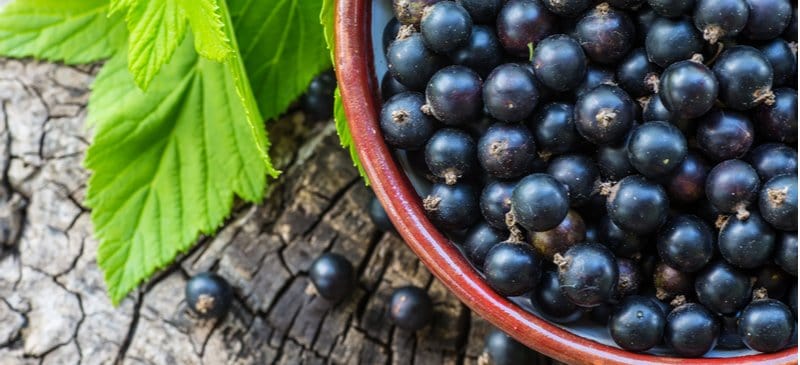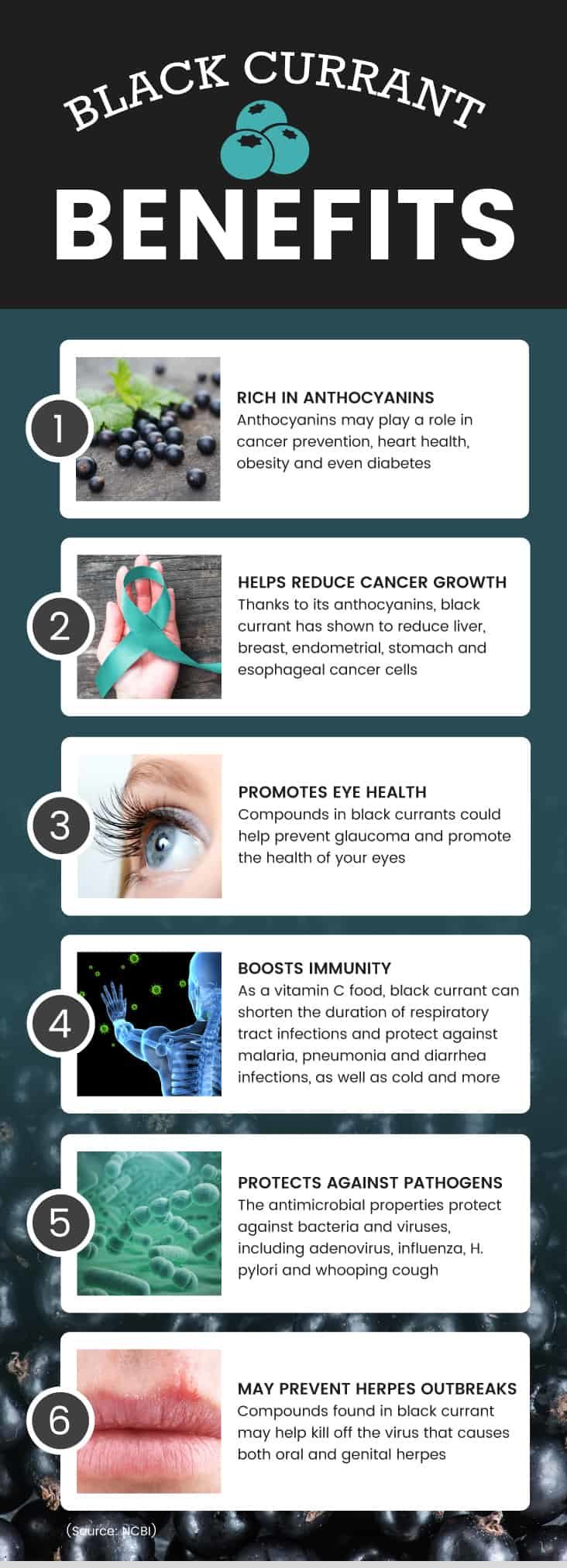
Nutrient-rich, versatile and jam-packed with health benefits, the black currant may not be well-known around the world, but it should be.
With emerging evidence showing that the black currant possesses antioxidant, antibacterial and antiviral properties and may be useful in slowing cancer growth, enhancing immunity and even preventing eye disease, this sour berry should be a must-try on everyone’s list.
Not only can you enjoy this flavorful berry all on its own, but it can also make a delicious addition to everything from baked goods to glazes and more. For even more added convenience, you can also pop a quick capsule of black currant oil to get an instant megadose of its many health benefits.
Whether you’re just hearing of black currants for the first time or they’ve been a longtime favorite in your household, these tart berries are high in health benefits and can be a nutritious addition to any diet.
What Are Black Currants?
Known by its scientific name Ribes nigrum, the black currant (also sometimes called blackcurrant) belongs to the gooseberry family of plants. This small shrub is native to certain parts of northern and central Europe as well as Siberia and thrives in the cold temperatures found in these regions.
For more than a half a century, growing and importing black currants were banned in many parts of the United States, giving it the name “forbidden fruit.” It was believed to spread a fungus that threatened the timber industry.
Today, commercial growth is allowed, as the affected trees are bred to resist such threats.
The plant is now cultivated commercially and domestically for its tart, nutrient-dense berries.
The black currant bush can produce up to 10 pounds of dark purple edible berries each year. The berries have a tart taste and can be eaten raw or used to make flavorful jams, jellies and juices.
Black Currant Benefits
1. Rich in Anthocyanins
The deep purple pigment of the black currant is attributed to its high anthocyanin content. Anthocyanins are plant pigments that produce a red, purple or blue hue depending on their pH.
Black currants contain a good variety of different anthocyanins, with some studies showing that they contain up to 15 unique types.
In addition to their role as a plant pigment, anthocyanins also possess many health-promoting properties. Research suggests that anthocyanins may play a role in heart health, and studies have shown that they may improve obesity and even diabetes.
They also act as antioxidants, which are compounds that neutralize harmful free radicals to prevent cell damage as well as chronic disease.
In addition to black currants, other anthocyanin-rich foods include berries, eggplant, red cabbage and grapes. Including a good amount of these foods in your diet can have a lasting impact on your health.
2. Helps Reduce Cancer Growth
One of the most impressive benefits of the black currant plant is its potential effect on cancer. Thanks to its high anthocyanin content, some research has found that black currant extract may help slow the growth of cancer.
In one test-tube study conducted by Northeastern Ohio Universities Colleges of Medicine and Pharmacy, black currant extract was able to help inhibit the growth of liver cancer cells.
Another study out of Japan found that black currant extract blocked the spread of breast and endometrial cancer cells.
Other research published in the Journal of Medicinal Food has shown that black currant extract may also be effective in killing off stomach and esophageal cancer cells.
3. Promotes Eye Health
Glaucoma is a group of eye diseases that can cause blurred and distorted vision and may even lead to blindness. This is typically a result of damage to the optic nerve, the nerve that connects the brain to the eyes.
Some studies show that the compounds found in black currants could help prevent glaucoma and promote the health of your eyes.
One study conducted in Japan and published in the Journal of Ocular Pharmacology and Therapeutics concluded that supplementing glaucoma patients with black currant extract was able to decrease levels of endothelin-1, a type of hormone that is thought to contribute to the development of glaucoma.
Another two-year, randomized, placebo-controlled study, again conducted in Japan at the Sapporo Medical University School of Medicine, found that black currant anthocyanins helped reduce vision loss and improved blood flow to the eyes in patients with glaucoma.
When used in combination with traditional treatments, black currant may be effective in promoting eye health and preventing vision loss.

4. Boosts Immunity
Black currant is bursting with vitamin C. In fact, just one cup of raw black currants can provide triple the amount you need for the entire day.
Vitamin C is well-known for its immune-enhancing and anti-inflammatory properties. Studies show that vitamin C can shorten the duration of respiratory tract infections and protect against malaria, pneumonia and diarrhea infections, among others.
One review from the Department of Public Health at the University of Helsinki in Finland comprised 12 studies and found that vitamin C supplementation cut common cold incidence by up to 91 percent and slashed the incidence of pneumonia by 80 percent to 100 percent.
Vitamin C also acts as an antioxidant that has proved to prevent damage to tissues caused by harmful free radicals and may even reduce the risk of cancer, heart disease and stroke.
For best results, pair black currant or black currant seed oil with other high vitamin C foods, such as fruits and vegetables, to keep your immune system strong.
READ RELATED: 30 Mouth-Watering Gifts for Foodies That Are All $50 or Less
5. Protects Against Pathogens
In addition to its powerful abilities as an antioxidant, black currant also contains antimicrobial properties that could help protect against harmful bacteria and viruses.
A 2012 study in Japan published in Microbiology and Immunology highlighted that black currant extract with a concentration of less than 1 percent was able to block the growth of several strains of viruses — including those responsible for adenovirus and influenza — by over 50 percent. An extract of 10 percent concentration was able to block 95 percent of these viruses from sticking to cell surfaces.
Another study from the Department of Microbiology at Asahikawa Medical College in Japan demonstrated that treating strains of influenza with a concentrated amount of black currant seed extract was able to completely suppress virus growth.
Other research has found that black currant oil may be effective against H. pylori, a type of bacteria that can cause stomach ulcers, abdominal pain and nausea.
6. May Prevent Herpes Outbreaks
Herpes is a common viral infection that affects millions of people worldwide. Symptoms can vary, causing fever blisters on or around the mouth in some people and painful, itchy genital sores in others.
Some studies show that the compounds found in black currant may help kill off the virus that causes both oral and genital herpes.
A study published in Phytotherapy Research showed that black currant extract stopped the herpes virus from adhering to cells and prevented the spread of the virus.
Coupled with traditional treatments and other natural remedies like L-lysine and zinc, black currant may be a useful addition to the diet to help prevent herpes outbreaks.
Nutrition Facts
Black currants are nutrient-dense foods, meaning they are low in calories but contain many important nutrients. They are particularly high in vitamin C and can meet and exceed your daily needs in just one serving.
These impressive berries are also high in gamma linolenic acid (GLA), an omega-6 fatty acid that has anti-inflammatory, health-promoting effects. Like all fatty acids, linoleic acid is used as a source of energy, working to regulate blood flow, immune function, inflammation and more.
The U.S. Department of Agriculture reports that one cup (about 112 grams) of raw European black currants contains approximately:
- 70.5 calories
- 17.2 grams carbohdyrates
- 1.6 grams protein
- 0.5 gram fat
- 203 milligrams vitamin C (338 percent DV)
- 0.3 milligram manganese (14 percent DV)
- 1.7 milligrams iron (10 percent DV)
- 361 milligrams potassium (10 percent DV)
- 26.9 milligrams magnesium (7 percent DV)
- 66.1 milligrams phosphorus (7 percent DV)
- 1.1 milligrams vitamin E (6 percent DV)
- 61.6 milligrams calcium (6 percent DV)
- 258 international units vitamin A (5 percent DV)
- 0.1 milligram copper (5 percent DV)
- 0.1 milligram thiamine (4 percent DV)
- 0.1 milligram vitamin B6 (4 percent DV)
- 0.4 milligram pantothenic acid (4 percent DV)
How to Use
Black currants may be available in some grocery stores as well as online. Keep in mind that they differ from Zante currants, which are simply dried Black Corinth grapes.
The black currant berries have an intense sour flavor and can be enjoyed either raw or used to cook both sweet and savory dishes. Because of their tart taste, many prefer to sweeten them up a bit when consumed raw by using a natural sweetener.
They can also be brewed into black currant tea or used to add a unique flavor to juices, jams, sauces, shakes and baked goods.
Here are some easy black currant recipes that you can try:
To squeeze in a quick and concentrated dose of all the beneficial nutrients found in black currants, you can also give black currant oil a try. Frequently found in capsule form, black currant oil is a good source of gamma linolenic acid, a type of omega-6 essential fatty acid, and is taken to promote healthy skin and hair.
Look for a capsule that contains at least 45 milligrams of GLA with minimal added ingredients, and take 500 milligrams twice daily.
History
Black currant has a rich history as a popular natural remedy and has been used for everything from treating gout to relieving PMS symptoms.
In the 1800s, black currant was extremely popular in the United States. In fact, in the 1920 census it was estimated that United States farmers were growing 7,400 acres of currants and gooseberries. However, many Americans today have never tried, let alone heard of, the black currant.
This is because it was later discovered that black currants were responsible for the spread of white pine blister rust, a type of fungus that began gradually killing off white pine trees. This became a major problem, as white pine trees were an essential component of the lumber industry.
By the 1920s, millions of white pine trees had been decimated by white pine blister rust, leading the federal government to ban and begin eradicating the black currant.
Today, most white pine trees have been bred to resist the effects of white pine blister rust. Commercial growth of black currants is no longer banned at the federal level, although several states do still have regulations in place to restrict growth.
In Europe, black currants have retained their popularity over the years. In fact, a black currant juice called Ribena was even given to children during World War II to prevent vitamin C deficiency after the import of citrus fruits like oranges, lemons and limes was blocked in the United Kingdom.
Black currant remains a popular ingredient for juices, jams and jellies in Europe. In the United States, black currants are not as common as they once were, but they have begun to thrive again in areas like Connecticut, Oregon and New York.
Recent efforts have begun to breed improved black currant varieties that are less susceptible to disease, yield more fruit and are more resistant to pests.
Risks, Side Effects and Interactions
Although uncommon, black currant may cause an allergic reaction in some people, especially in those who have a sensitivity to salicylate, a compound that occurs naturally in some plants. If you experience symptoms like rashes, hives or swelling after eating black currant, you should discontinue use immediately.
Black currant seed oil may also cause side effects for some individuals, including gas, headaches and diarrhea.
Those who are taking phenothiazines, a class of anti-psychotic medications, should not take black currant as it may increase the risk of seizure.
Additionally, black currant may slow blood clotting. If you have a bleeding disorder or are taking a medication for blood clotting, such as Warfarin, you should consult with your doctor before taking black currant.
You should also not take black currant prior to surgery as it may increase bleeding risk.
Final Thoughts
- Black currants, or ribes Nigrum, are low in calories but high in many nutrients, especially vitamin C.
- They possesses strong antioxidant, antiviral and antibacterial properties that can help prevent infection and disease and promote many aspects of health.
- They have also been shown to help prevent eye disease, reduce the growth of cancer and even block herpes outbreaks.
- You can enjoy these sour berries all on their own, use them in cooking or try a black currant supplement for an easy way to take advantage of the nutritious benefits of black currant.
Source: Dr. Axe | Nutrition






